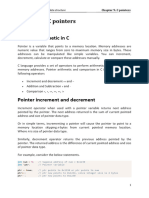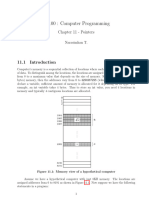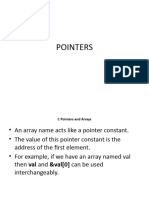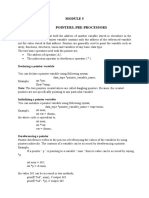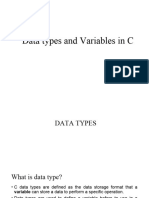0% found this document useful (0 votes)
47 views30 pagesPointers Arithmetic Operations
Pointer arithmetic allows incrementing, decrementing, adding, and subtracting integers from pointers. However, some operations are invalid, such as adding two addresses together. Pointer comparisons are only valid between pointers pointing to the same array. Invalid pointer operations include addition, multiplication, division, and bitwise operations between two addresses.
Uploaded by
Nishok NishokCopyright
© © All Rights Reserved
We take content rights seriously. If you suspect this is your content, claim it here.
Available Formats
Download as PPTX, PDF, TXT or read online on Scribd
0% found this document useful (0 votes)
47 views30 pagesPointers Arithmetic Operations
Pointer arithmetic allows incrementing, decrementing, adding, and subtracting integers from pointers. However, some operations are invalid, such as adding two addresses together. Pointer comparisons are only valid between pointers pointing to the same array. Invalid pointer operations include addition, multiplication, division, and bitwise operations between two addresses.
Uploaded by
Nishok NishokCopyright
© © All Rights Reserved
We take content rights seriously. If you suspect this is your content, claim it here.
Available Formats
Download as PPTX, PDF, TXT or read online on Scribd
/ 30



























